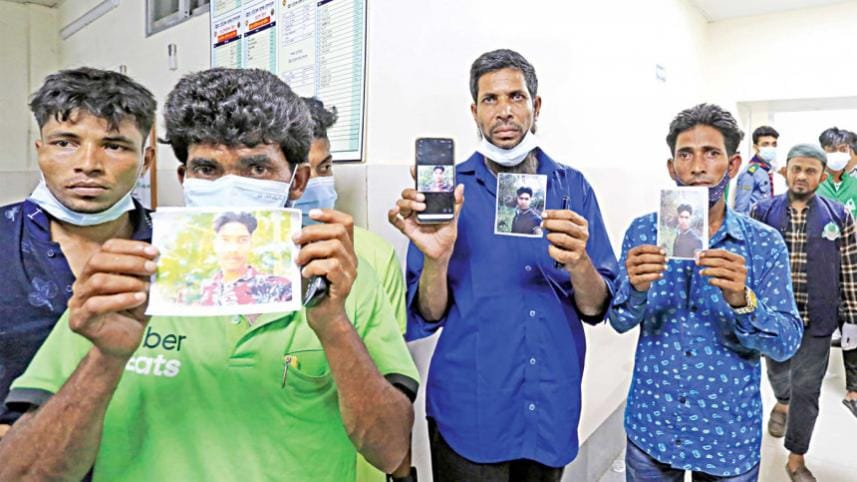A company’s negligence killed 44 people. What price will it pay?

The deadly fire and explosion at the BM Container Depot Ltd in Chattogram's Sitakunda upazila have killed at least 44 people, and injured over 300 others. The revised death toll was announced during a press briefing held by the Fire Service and Civil Defence on June 7 afternoon, which also disclosed that 12 of the 44 people killed were Fire Service personnel. Therefore, it is likely that the remaining 32 deceased individuals were workers of the depot.
This explosion comes less than a year after the horrific fire at Hashem Foods Factory, which killed 52 workers, including at least 17 children, which the Nagarik Tadantya (Citizens' Investigation) Committee found was caused by lethal corporate negligence. It comes as yet another brutal reminder that, despite our much-celebrated growth and development, the occupational safety of workers who made them possible remains a painfully distant dream.
The Department of Explosives has stated that BM Container Depot Ltd did not obtain any licence to store hydrogen peroxide, the presence of which initial reports suggest caused the explosion. Tofazzol Hossen, inspector at the Chattogram office of the Department of Explosives, told The Daily Star, "We were not informed that chemicals were stored there. They did not take any licence or approval from us. There is no legal scope for hoarding dangerous goods in such a space surrounded by locality."
The inspector also mentioned that the storage of such chemicals requires a specialised facility where temperatures can be controlled, and which must be situated far enough from the nearest locality – and that neither of these conditions were met by the BM Container Depot authorities.
What I wish the inspector had also mentioned is the last time the department had sent an inspector to inspect this 30-acre depot.
Fire Service officials have also alleged that they were not informed that chemicals were being stored in the depot. If they had that information, they could have taken cautionary and responsive measures accordingly to not only put out the blaze more effectively, but also protect the lives of firefighters and bystanders. Fire Service and Civil Defence Director-General Brig Gen Md Main Uddin told The Daily Star, "I've been working with the Fire Service for almost 25 years. In all these years, I have never seen this many deaths [of firefighters] in a fire incident."
Some of the surviving workers told Prothom Alo that the pocket gate on the south side of the depot was locked at the time the fire broke out, thereby preventing workers trapped inside from escaping.
The story is emerging to be one we are all too familiar with: a deadly combination of corporate negligence and non-compliance, which is allowed to thrive and send off workers to preventable deaths, because workers lives are disposable, but business must always go on.
So, what is the price of 32 dead workers to a company that seemingly puts profit over people?
Well, according to Chapter XII of the Bangladesh Labour Act, 2006 (read with the Fifth Schedule to the Act), the owners of BM Container Depot Ltd are only required to pay Tk 2 lakh for every worker killed in the explosion. However, the depot authorities have published a press statement declaring that they would pay Tk 10 lakh of "cash/financial assistance" ("nogod shohayota") to the families of those killed in the "accident" ("durghotona"). Therefore, the total amount of "financial assistance" they are planning to pay to the families of 32 deceased workers is Tk 3.2 crore. Whether any "assistance" would also be paid to the families of the 12 dead Fire Service personnel was not clearly mentioned.
The press statement also mentions that the company would pay an adult family member of each of the deceased workers a monthly amount that is equal to the monthly salary the worker used to earn, until the worker's children reach adulthood. However, in the absence of any legally enforceable mechanisms, such voluntary commitments have amounted to little more than empty promises in the past.
The director of BM Container Depot Ltd told Prothom Alo that his company was "ready to set an unprecedented instance of humanity" for the "affected people" in this "accident." It is well worth noting that the proposed payment is referred to as "financial assistance" instead of "compensation" or "damages" in their press statement. The difference between these words is not just a matter of semantics, but the difference between charity and accountability. "Compensation" and "damages" speak the language of accountability – and corporations refuse to be held accountable.
For perspective, BM Container Depot is one of the many companies owned by the Smart Group of Industries, an industrial conglomerate that owns corporations in an array of sectors ranging from the energy sector to the RMG sector. The Tk 3.2 crore that the depot authorities are offering to pay is only 0.2 percent of Smart Group's self-declared annual revenue of USD 160 million from RMG exports alone, as mentioned on its website.
When the price of a worker's death is limited to Tk 2 lakh in the very law that was meant to "ensure labour rights," employers (who store hazardous chemicals without proper licence, putting workers lives at acute risk) can then advertise the payment of Tk 10 lakh as a grand act of magnanimity or "unprecedented instance of humanity" – instead of having to fear unlimited liability from a class action lawsuit that would sue them for all they're worth for committing gross corporate negligence that led to the preventable loss of lives.
As long as there is no real price to pay for corporate negligence, companies won't have the incentive they need to stop acting so negligently, and workers will continue dying preventable deaths.
Taqbir Huda is a legal researcher and coordinates Justice for All Now (JANO), Bangladesh. Email: taqbirhuda@gmail.com




 For all latest news, follow The Daily Star's Google News channel.
For all latest news, follow The Daily Star's Google News channel. 

Comments